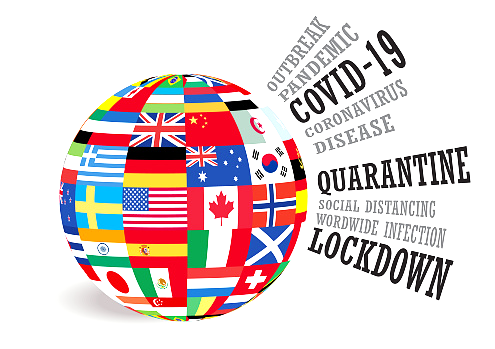
Avellon Williams
TRINIDAD AND TOBAGO – The ongoing COVID-19 pandemic has decimated the economies of all the countries in the world.
What started as a virus in the Chinese province of Wuhan in December 2019, quickly engulfed the rest of the world to the extent that the World Health Organization (WHO) declared it as a public health emergency on January 30th, 2020.
The highly contagious disease spread so rapidly, ravaging healthcare systems and killing patients, that the WHO declared it a global pandemic on March 11th, 2020, and by the end of March, most countries had implemented lockdowns and shut their borders, grinding all activities to a screeching halt.
From that time until now, over two years later and although vaccines have been developed to help fight the effects of the disease, there’s still much uncertainty as to if or when things will ever return to normal.
NEW REALITY

The COVID-19 pandemic brought visible changes to daily life. People walked outside and saw different surroundings, the chief one being that most people wore face masks to protect themselves against disease.
Cities and towns were emptied as some public sector operations and private businesses implemented work-from-home policies, which meant fewer people commuting to work and fewer cars on the roads.
Many small businesses and restaurants closed permanently as they struggled to cope with the loss of business after hundreds of people also lost jobs due to the economic strain brought on by the pandemic. The tourism industry was severely hit as people avoided air and sea travel for leisure and even business.
This was the new reality in which people lived during the initial two years of the pandemic. In that time, the world embraced teleconferencing, telemedicine, virtual learning and schooling, webinars, increased use of social media, streaming music, working remotely, online markets and shopping, development of restaurant ghost kitchens, and relied upon virtual diplomacy.
New delivery, curbside pickup, and various transportation methods were developed. Many of these changes remain and lessons learnt during the pandemic will influence future directions as the world tried to restart itself since vaccines are easily available.
As part of the “new normal,” the workplace has changed. Many companies moved to remote working. Some workspaces were retrofitted with upgraded air handling systems to increase people’s personal safety.
Rather than high-rise densely packed office spaces, there is a shift towards low-density offices. According to Bhushan Sethi (2020), in Joint Global Leader, People, and Organization, PwC, “The accelerated shift to flexible working has been valuable for many companies. Whatever new models emerge, it’s clear that employee-oriented policies that invest in safety, protection, and well-being could become the new differentiator for recruitment, retention, and company reputation.”
In addition, the increased use of artificial intelligence and automation are transforming the way work is completed. As companies and organizations are changing and reorganizing to be more competitive and profitable. What is evolving is the model that works best for both business and labour, satisfying the needs of the companies and their employees.
Working from home or anywhere in the world is now becoming the norm. Some employees take the initiative and provide ideas on how their work outside the physical office can be more productive. But will work-from-home or hybrid working be able to level playing fields in terms of equality and diversity?
How will employees be affected by losing the social aspects of work and interaction with colleagues, etc.?
Apart from Trinidad and Tobago and Guyana, whose economies are petroleum-based, most of the economies of the Caribbean islands are heavily reliant on tourism.
With border restrictions and travel almost non-existent worldwide during the height of the pandemic, it meant their economies were severely affected. This could not have come at a more inopportune time for the Caribbean.
HOW RAPIDLY CAN CARIBBEAN ECONOMIES RECOVER?

For many Caribbean countries, normalization will depend crucially on the availability of vaccines for their population; particularly those working in the tourism (hotels, restaurants, transportation, etc.), education and health sectors.
As far as the revitalization of air travel is concerned, the availability of tests required in some cases for visitors to return to their home countries will also be crucial to ensure that once borders fully reopen, tourism offerings will remain desirable compared to other possible destinations across the world. Given these and many other complex factors affecting the recovery, considerable uncertainty remains.
Against this backdrop, one important measure of gauging normalization is the economic recovery of countries. Based on the latest available data and projections, only Guyana saw positive real per capita GDP growth in 2020 relative to 2019, owing to the start of production in its oil industry.
All other Caribbean and OECS countries for which data is available saw declines. Of these, only two other countries are expected to return to pre-crisis per capita income levels by 2022—Jamaica and St. Vincent and the Grenadines.
Most of the rest of the region’s economies may only fully recover in either 2023 or 2024. St. Kitts and Nevis and Suriname are set to experience even longer delays.
In the case of Suriname, current projections envision a recovery horizon that could last well into the decade, though faster progress with macroeconomic reforms could help accelerate this transition.





Recent Comments